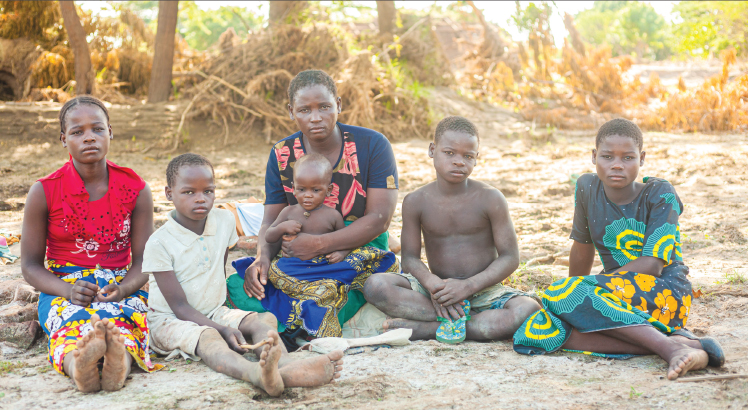Children hit by climate change
Children keep bearing the brunt of climate change, which has increased the frequency of devastating disasters.
When moderate Tropical Storm Ana wreaked havoc in Malawi’s Southern Region, Douglas, Chifuniro and their siblings lost their father, a hero who died desperately searching for a way to save his family.
“He left us to search for a higher ground where we could perch to survive the storm, but he never returned,” sobs Douglas, 12.
That fateful night, his family did not sleep. By midnight, they fled their collapsing house alongside their father.

Douglas said: “That was the last journey with our father.Mom strapped my baby brother, Horace, on her back while father, my three sisters and I were running, fearing for our lives.”
Chifuniro, nine, was equally horrified.
“The high ground where we stood was quickly flooded, so father went to search for a safer place, but we waited for a long time and he did not return to save us,” she laments.
The family, together with their neighbours, climbed a big tree as floods surged. They surmounted coldness, stinging insects, the awe of falling down and the fear of what may have befallen their father.
Their mother, Rose, was curious to know why her husband had not returned.
“In the morning, we searched for him in the village only to be told that some people had seen him washed away by water, but couldn’t save him,” Rose explains.
The man is feared dead as his body is still missing.
“On January 29, we held a vigil in honour of him,” she explains.
Rose now raises the five children single-handedly. The task is never easy, she says.
The overwhelmed mother explains: “Since we lost all our belongings, we have to start from zero. It’s hard for the children to go to school hungry. They also lost all their books and uniforms.”
There are more sad tales in all the districts across the Southern Region where Ana affected nearly one million people.
In Neno, the rainstorm ripped three houses on one compound. The owners? Father aged 44. Son, 27. Daughter, 24. The head of the compound, Steven Sumati, is partially blind. Faggy, his daughter, has a serious sight disorder and his son, Maliko, fell blind aged 12.
When their houses collapsed, the three, together with Faggy’s children, stood on a veranda of a cracked house all night.
As people were still recovering from the devastating effects of Tropical Storm Ana, Cyclone Gombe hit.
Department of Climate Change and Meteorological Services director Lucy Mtilatila says climate change is increasing the frequency of tropical cyclones.
“Favourable temperature for cyclone development is above 27 degrees Celsius, therefore an increase in temperature supports increase in tropical cyclone development,” she explains.
The weather expert reckons Malawi and the neighbouring countries are likely to experience nine storms a year.
But she is concerned that the country is slow in building resilience to effects of climate change. Mtilatila attributes this to widespread poverty and back-to-back nature of the climate shocks, which give prone communities little or no time to bounce back.
“It is time to revisit where we are settling by avoiding disaster prone areas. Rehabilitation of degraded land, restoration of forests is important,” she states.
Mtilatila also urges Malawians to utilise climate information in construction and to stop settling in disaster zones.
Last week, Malawi hosted the Sadc Green Climate Conference.
In his speech, Minister of Forestry and Natural Resources Eisenhower Mkaka observed that southern Africa is highly vulnerable and hit hard by disasters caused by climate change due to low adaptation and resilience to well-known impacts.
“This is further exacerbated by limited early warning, inadequate preparedness and recovery capacity, and an unsustainably high dependency on natural resources for livelihoods and energy,” he stated.
Following the storms, World Vision, United Nations Children’s Emergency Fund, Care Malawi, Feed the Children and other humanitarian organisations are supporting government to provide humanitarian aid.
Ministry of Gender, Community Development and Social Welfare deputy director of child affairs Trevor Hamela, says more support is required to lessen the suffering of children and help them bounce back better.
The gaps persist in terms of food rations, clothes, tents, play materials in children’s corners and community-based childcare centres (CBCCs).
He adds: “As you are aware, Tropical Storm Ana and Cyclone Gombe damaged roads, schools, CBCCs and crops.
“This means that there will be food shortages in most communities and food supply in CBCCs will be problematic. For two months, CBCCs and school attendance and operations have been disturbed.”






One Comment